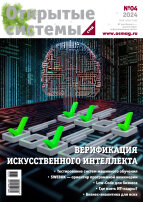_250x.jpg)
SECURE COMMUNICATIONS
5G, Security, and You
As the increased capacity of 5G has changed the process of viewing, managing, and controlling data security, it also brings added security concerns.
Nir Kshetri (nbkshetr@uncg.edu), professor, University of North Carolina at Greensboro; Jeffrey Voas (j.voas@ieee.org), editor-in-chief, Computer.
Security Test
Food for Thought: Fighting Fake News and Online Disinformation
Fake news are becoming a growing concern for several industrial sectors and the society at large. In this article, the authors explain why people are susceptible to fake news and what types of impact fake news can cause, taking examples from the agrifood and other sectors. The authors discuss how advances in machine learning and semantic technologies can be utilized to detect fake news and mitigate online disinformation.
Konstantinos Demestichas (cdemest@cn.ntua.gr), research scientist, Konstantina Remoundou (kremoundou@cn.ntua.gr), data analyst, Evgenia Adamopoulou (eadam@cn.ntua.gr), senior research associate, National Technical University of Athens.
Security Test
The Internet of Things connects devices with each other and cloud services to create new user experiences. Connectivity, however, invites cyberattacks, which are growing with the use of more standardized equipment, such as Ethernet and Linux software stacks. Risk-oriented security testing through a mix of methods and tools facilitates the transparent hardening of critical systems. The article provides an overview of industry-scale technologies for security testing.
Christof Ebert (christof.ebert@vector.com), Senior Member, IEEE; Youssef Rekik (Youssef.Rekik@vector.com), consultant, Vector Consulting Services; Rahul Karade (rahulskarade@gmail.com), research scientist, University of Stuttgart.
PLATFORMS
The Next Chapter in Manufacturing Evolution: Industrial Cloud
Manufacturing optimization based on vast data amounts generated by a plant could be achieved through comprehensive real-time analytics done in an industrial cloud that integrates vehicles, machining tools, management systems, and AI technologies.
Viktor Popov (vp282@cornell.edu), data scientist, Opex Analytics (Redwood City, USA); Dmitry Volkov (vlk@keldysh.ru), fellow, M. V. Keldysh Institute of Applied Mathematics (Moscow).
ARM for HPC: Has the Time Finally Come?
ARM chip designers have seriously set their sights upon the high-performance computing market. In fact, Marvell ThunderX2 CPUs stand a good chance of succeeding in competition, especially in terms of price performance ratio.
Mikhail Kuzminsky (kus@free.net), senior fellow, N.D. Zelinsky Institute of Organic Chemistry (Moscow).
SOFTWARE ENGINEERING
Transitioning to Agile — In a Large Organization
Change is difficult. A big organization that is set in their old ways of doing things will have big resistance to change. Transitioning to agile is one such change. There are several problems an enterprise would face when transitioning to agile from waterfall software development methodology. It might be as trivial as a team not being colocated, or it could be complete lack of trust between the development team and business partners.
Karthik Mohanarangam (karthik.mohanarangam@gmail.com), technical program manager, Amazon.
STANDARDS
RISC-V: The Standard That has Changed the CPU World
Over half a century, the microprocessor industry has come quite a long way. Modern chips have almost no similarity to the CPUs of yesteryear, with the main difference being that the key evaluation criteria of the new architectures are now cost, openness, and developer support. That said, RISC-V architecture has shown quite a number of benefits opening new opportunities for developers, including in Russia.
Vladimir Frolov (vova@frolov.pp.ru), Vladimir Galaktionov (vlgal@gin.keldysh.ru), research fellows, M. V. Keldysh Institute of Applied Mathematics (Moscow); Vadim Sanzharov (vadim.sanzharov@graphics.cs.msu.ru), research fellow, Faculty of Computational Mathematics and Cybernetics, Moscow State University (Moscow).
DBMS
Data base: multimodel, convergence and artificial intelligence
Multi-model support, AI, Database-as-a-Service, self-management, sharding, nonvolatile memory use, hardware accelerated vector processing, etc. – what features would become standard for the next-decade databases?
Mark Rivkin (mark.rivkin@oracle.com), technology consulting director, Oracle CIS (Moscow).
OPINION
How to Help a Bot?
Ensuring high-quality personalized customer experience is a must these days for any business wanting to succeed. Analytics technologies and smart chatbots facilitate better service for customers using call centers, although this requires enabling smooth cooperation between digital agents and people.
Tatyana Zobnina (tzobnina@naumen.ru), senior analyst and ML systems developer, Naumen (Moscow).
DATA ACADEMY
Alfa Data School: Building Your Own Talent Pool
Maksat Nuridenuly, Alfa Bank Kazakhstan managing director and chief data & operating officer, tells about Alfa Data School, the bank’s own training center tasked with facilitating a data management strategy and creating data-centric culture in the organization, as well as helping form the data industry in the country.
Natalya Dubova (dubova@osp.ru), science editor, Open Systems Journal.DBMS (Moscow).
DAMA-DMBOK2: Not Lost in Translation
In 2019, the first-ever Russian translation of DMBOK2 book by Data Management Association was published.
Nikolay Skvortsov (nikolay.skvortsov@unidata-platform.ru), head of methodology, Unidata.
LIBRARY
Could Increasingly Complex Cyberphysical Systems Be Trusted?
The March, April, and May issues of Computer magazine (IEEE Computer Society, V. 53, No. 3–5 2020) cover distributed data processing, as well as ensuring secure, reliable, and trusted operation of intelligent cyberphysical systems.
Alexander Tyrenko (shoorah@osp.ru), reviewer, Computerworld Russia (Moscow).
